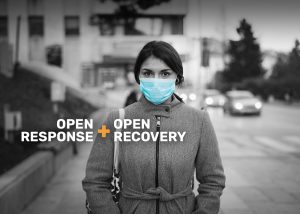Don’t Let Cash Slip Away: Strengthening Government Oversight of Stimulus Spending Through Robust Institutions with Broad Mandates
This blog post is the second in a series that looks at the four core ingredients for strong government oversight of stimulus spending. Read the introductory piece here.
Around the world, governments are implementing massive stimulus packages to protect individuals’ economic and physical wellbeing in the midst of the pandemic. Robust oversight mechanisms are essential to ensure these huge social programs reach intended recipients. However, many governments are struggling to effectively monitor their complex and evolving stimulus programs. In this post, I outline how oversight bodies with strong legal and actual institutional strength as well as a broad mandate contribute to effective stimulus oversight.
There are two important categories of institutional strength. First, oversight bodies must have a robust legal authority (de jure power) to monitor stimulus spending. Second, oversight mechanisms require ‘actual’ (de facto power) capacity, authority, and independence to carry out their mandate. Additionally, it is important that government oversight mechanisms have a broad mandate that expands beyond anticorruption efforts to include evaluating the effectiveness and equity of stimulus spending.
Institutional Strength
Strong legal authority (de jure power)
Money can slip through the cracks when stimulus programs do not have an explicitly dedicated oversight body. Additionally, some public officials are intentionally creating gaps in oversight through carve outs and exemptions. For example, stimulus legislation in the United States exempted the Federal Reserve’s bond buyback program from standard legal transparencyAccording to OGP’s Articles of Governance, transparency occurs when “government-held information (including on activities and decisions) is open, comprehensive, timely, freely available to the pub... More requirements. There must be explicit oversight for each element of a stimulus package.
Beyond simply ensuring that oversight is present for all stimulus elements, it is vital that at least some of these mechanisms have the authority to enforce accountability measures. Oversight bodies vary in their enforcement powers. Prosecutors and some parliamentary committees can compel documents and testimony. However, auditors and ombudsmen are often limited to issuing recommendations and reports.
Therefore, systems of oversight are most effective when institutions are complementary and interlinked. For example, the European Union’s Auditor and Ombudsman can refer suspected criminal activity to the European Anti-Fraud Office for investigation and prosecution. Similarly in South Africa, auditors and inspectors report directly to the Parliament, where the multi-party system ensures a lively response to their findings and recommendations. Given government accountability bodies’ differing strengths, oversight is strongest when there are a constellation of institutions. While these institutions need to carry out their work with independence, they must also be interconnected so that a prosecutor’s work can begin where an auditor’s mandate ends.
Strong ‘actual’ authority (de facto power)
Secondly, institutional strength is also determined by oversight mechanisms’ actual ability to carry out their mandate through sufficient capacity, powers, and independence. While stimulus oversight in the United States is strong on paper, the Trump Administration has sought to render the relevant institutions toothless through mismanagement and interference. President Trump removed the head of PRAC and nominated a former White House lawyer for the role of Special Inspector General for Pandemic Recovery. Similarly in Brazil, President Bolsanaro removed the Head of Federal Police and the Head of the Federal Police in Rio de Janeiro to consolidate control over investigations. In contrast, the government of New Zealand established a bipartisan parliamentary oversight committee chaired by the opposition, which benefits from the resources and independence guaranteed to parliamentary committees.
Broad Mandate
When there are strong and independent oversight bodies, their mandate typically stops short at monitoring compliance and weeding out corruption. Some oversight mechanisms also monitor the effectiveness of stimulus spending. However, there is limited oversight of whether stimulus packages are equitably distributed. A strong system of oversight must have institutions responsible for overseeing corruption, efficiency, effectiveness, and equity to ensure emergency spending reaches the most vulnerable.
Of all institutions, parliamentary committees are most likely to consider the equity impacts of stimulus spending, as the United States’ COVID-19 Congressional Oversight Commission demonstrates. One exception is Brazil’s Federal Prosecutor for Citizen Rights, who requested that the Ministry of Health provide information on how it intends to address COVID-19 in informal settlements and rural areas. The Prosecutor explicitly stated he would monitor the government’s service delivery throughout the pandemic to ensure it didn’t further entrench inequality.
Implications for Oversight Design
With these obstacles in mind, the following recommendations can help governments nurture open stimulus oversight systems:
Strong and broad legal mandate (de jure)
- Comprehensive oversight: Ensure all elements of stimulus packages are monitored by an oversight mechanism. Avoid vague oversight promises that do not concretely identify which mechanism will oversee what stimulus program. Avoid creating oversight gaps through carve outs and exemptions from standard oversight requirements.
- Independence: Protect oversight bodies from outside interference by ensuring they have the authority to open investigations and set their agenda. Protect members from unilateral dismissal or retaliation.
- Triggers: Disclose whether and how frequently the body will conduct and publish reviews. Provide multiple channels for whistleblower and public complaints.
- Broad Mandate: Beyond monitoring compliance and effectiveness of stimulus spending, create mechanisms that consider an equity perspective to ensure funds are reaching intended beneficiaries – whether those are workers, women, people living in poverty, or small and medium-sized enterprises.
Strong ‘actual’ (de facto) oversight powers
- Capacity: Ensure institutions have sufficient personnel, financial, and technical capacity as well as the authority to collect the documents, data, and testimony needed to conduct comprehensive investigations.
- System of oversight: Empower a variety of institutions to conduct oversight, ensuring at least some have the authority to conduct formal investigations and prosecutions as well as influence financial management and stimulus spending policies.
- Interagency coordination: Facilitate coordination and information sharing among the supreme audit institution, parliamentary committees, federal prosecutors, and other bodies involved in stimulus oversight.
Featured Image: Government District in Berlin, Germany. Credit: Max Pixel
No comments yet
Related Content

Don’t Let Cash Slip Away: How to Build Strong Government Oversight of Stimulus Spending
As governments around the world implement massive stimulus packages to protect individuals’ economic and physical wellbeing in the midst of the pandemic, robust oversight mechanisms are essential to ensure these…

Don’t Let Cash Slip Away: Strengthening Government Oversight of Stimulus Spending Through Disclosure and Public Participation
Explore why public participation and disclosure are crucial elements for a robust government oversight mechanism. This is the third blog in a limited series on strengthening government oversight of stimulus…

Open Response + Open Recovery
Our community’s fundamental values of accountability, transparency, inclusivity, and responsiveness are vital as we move through COVID-19 response to recovery. Find resources, events and examples from OGP and partners.


Leave a Reply